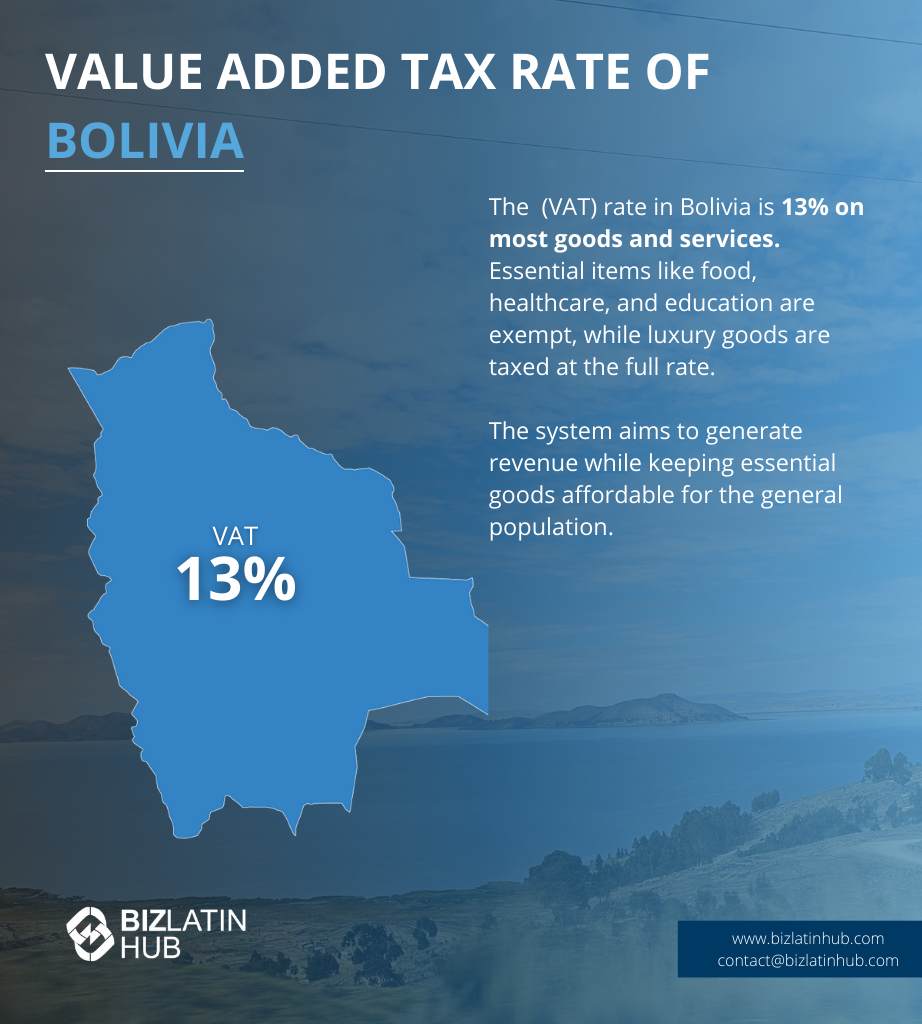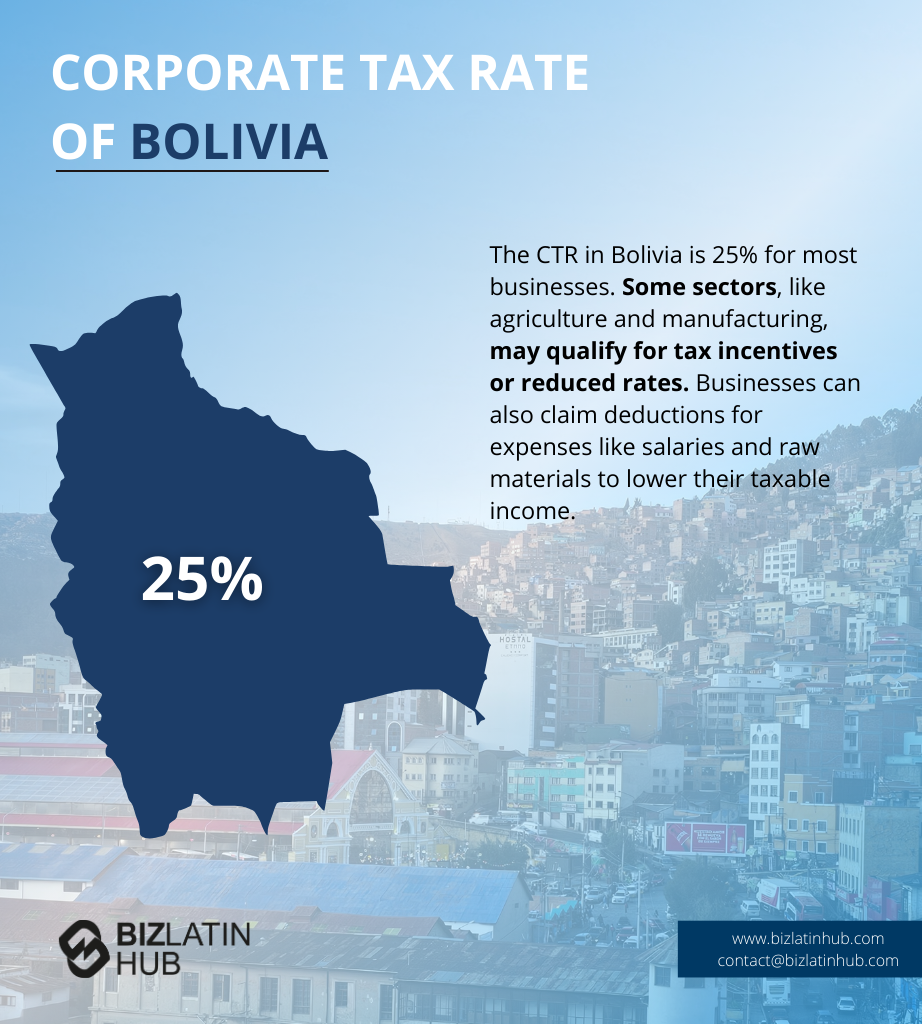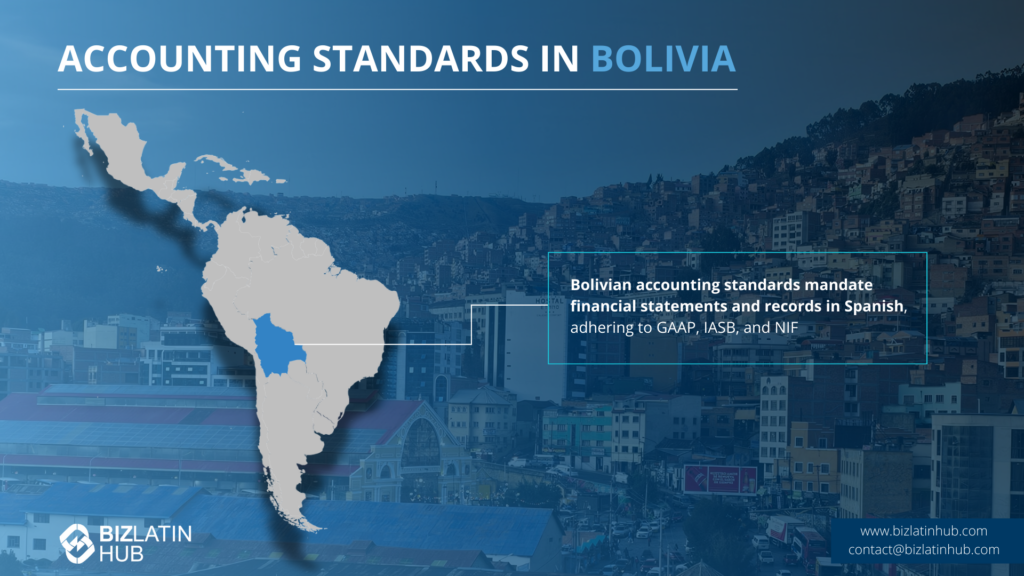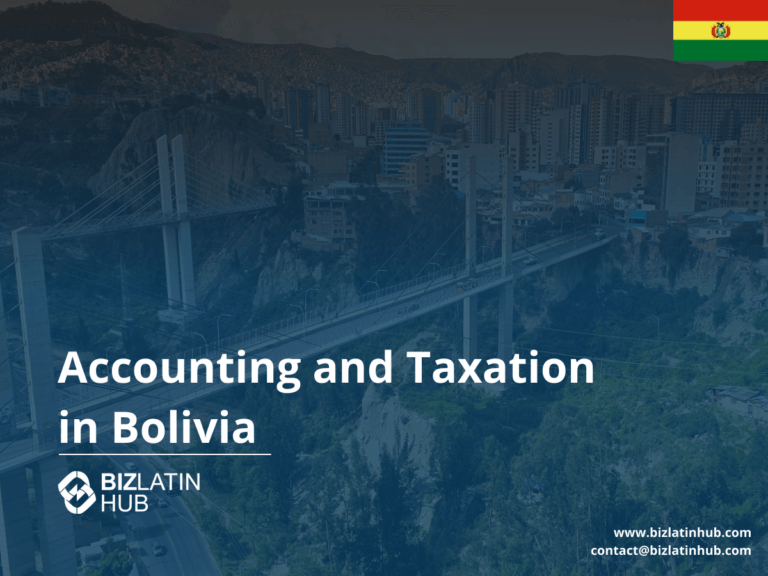Accounting in Bolivia is an essential component of your market entry strategy to establish a business and ensure adherence to its intricate regulatory framework. This guide offers critical insights to help you manage your fiscal responsibilities after your company formation in Bolivia. SIN (Servicio de Impuestos Nacionales) is Bolivia’s tax authority that oversees income tax, VAT, payroll, and electronic invoicing. Since 2023 UBO reporting has also become mandatory as the country improves transparency.
Key Takeaways On Accounting in Bolivia
| What Are The Accounting Standards in Bolivia? | Bolivian accounting standards mandate financial statements and records in Spanish, adhering to GAAP, IASB, and NIF. |
| What Is The Corporate Tax Rate in Bolivia? | The current corporate tax rate in Bolivia is set at 25%. Additonal tax rates exist for mining/extractive companies. |
| What Is The Bolivian Value Added Tax Rate? | The VAT rate (IVA) in Bolivia is currently 13%. |
| Dividend Tax Rate in Bolivia | Dividend payments, profit distributions to head offices by Bolivian branches, interest, royalties, and service fees paid to non-residents are subject to a 12.5% withholding tax. |
Overview of Bolivia’s Tax and Accounting Framework
Understanding accounting requirements in Bolivia are crucial for your company’s activities and financial records. Below we specify some accounting regulations. IFRS reporting is mandatory for large companies while SMEs follow simplified rules. Annual submission is required, with the date varying depending on the sector you work in.
The mandatory accounting books or records in the country are: Libro Diario, Mayor y de Inventario y Balances, and other books that sectorial laws require, must be kept in Spanish and in the national currency. National legislation also allows accounting records to be kept by electronic or computerised means.
The accounts shall be kept by legally qualified accountants, to whom the regulatory rules on responsibilities, performance, remuneration and the keeping of the accounts apply.
Invoicing: The National Tax Service (SIN) periodically establishes , the requirement to use online invoicing methods. This is based on technical criteria that include economic activity, number of economic activities, invoice volumen, tax behavior, total invoice amount and e-commerce and related services.
The Commercial Registry (Registro de Comercio) is the entity in charge of monitoring and supervising the commercial activities of companies.
The SIN is the entity responsible for managing and overseeing national tax collection, tax registry and implementation of tax policies in Bolivia. Departmental governments and municipalities are in charge of departmental and municipal taxes.
Corporate Income Tax, VAT and Transaction Taxes in Bolivia

Your company will primarily be subject to corporate income tax, value added tax (VAT) and social security contributions in Bolivia.
For VAT, there is a limited refund eligibility for exporters with proper documentation. The process is handled through SIN directly.
Below is a list of aspects to consider when it comes to taxes in Bolivia:
- The value added tax rate is 13%, which is a low percentage compared to other countries in the region. It does not apply to all export products and services.
- The capital gains tax rate is 25%, but it is exempt from the payment of transaction tax in the Bolivian stock market.
- The tax rate for establishing a branch of a company in Bolivia is 12.5%.
Employing workers in Panama means that you will have a number of tax responsibilities on behalf of your employees as well as contributions to make to the social security system. The contributions established by Bolivia’s labor laws will be calculated from each employee’s salary as follows:
| Contributions to be covered by the employer | Contributions to be covered by the employee |
| Health insurance: 10% Contribution pro: 2% Professional risk: 1.71% Employer contribution: 3% | Social security: 10% Common risk: 1.71% Insured contribution: 0.5% Pension fund fee: 0.5% |
| Total: 16.71% | Total: 12.71% |
Additionally, Bolivia applies a further tax known as the RC- IVA or RC- VAT. This is calculated by the salary amount received by the employee after the 12.71% contribution mentioned above, if the salary is higher than 4 times the national minimum wage.
Like many other Latin American countries, you must also pay an aguinaldo (13th salary) bonus annually and report payroll monthly through electronic platforms administered by SIN.
SIN, UBO, and Tax Filing Deadlines
Companies must pay an average corporate tax rate of 25%, depending on the size of the turnover. CIT is due in March–May, depending on tax number. VAT must be paid monthly by the 13th and payroll is also monthly via RUPE. Each company must appoint an auditor to submit annual audited financial statements.
- Banking, commercial, and service activities have a fiscal year of 31 December
- Industrial, oil and gas companies have a fiscal year ending 31 March;
- Agro-industrial and forestry companies have a fiscal year ending 30 June
- Mining companies’ fiscal year ends 30 September.
Since 2023, Bolivia has had mandatory UBO registry. This is defined as someone who has 20% or more of the shares of a company or wields significant control through other means (such as veto powers on the board or so forth). UBOs must be registered with SIN and the information updated annually alongside CIT declaration. Failure to comply leads to significant fines.
In addition, departmental and municipal governments (local territory level) impose tax on windfalls, real estate and vehicles. The rate for these taxes is set forth in departmental and municipal ordinances adopted by each local municipality on an annual basis.

The Following Activities are Prohibited in Accounting Books
- Altering the progressive order of dates of operations
- Leaving blank spaces
- Making interlinings or superimposed markings
- Making scratches, erasures or amendments to all or part of the entries
- Removing leaves, altering the order or mutilating the leaves of the books.
Books containing such irregularities have no probative value in favour of the trader who keeps them.
FAQs About Accounting and Tax in Bolivia
Based on our extensive experience these are the common questions and doubts from our clients when looking to understand accounting requirements in Bolivia.
The standard corporate income tax (IUE) in Bolivia is 25%. Financial institutions and hydrocarbons companies may face additional surcharges. Companies distributing dividends must also pay a Complementary Tax (IUE Complementario).
Businesses in Bolivia are subject to various taxes, including corporate income tax, IVA (VAT), Transactional Tax and Municipal Taxes. The tax regime can vary depending on companies’ activities and their location.
An additional rate of corporate income tax of 12.5% is applied on mining operations resulting from favorable prices in minerals and metals (on exploitation activities)
In Bolivia, the equivalent to the IRS (Internal Revenue Service) is known as the “Servicio de Impuestos Nacionales” (SIN).
Bolivian accounting standards require companies to prepare their financial statements in Spanish and Bolivia must follow GAAP, IASB, and NIF. Accounting registries and books of account must be recorded in Spanish.
In Bolivia, individuals who are certified accountants and have met specific professional requirements are typically known as “Contadores Públicos.” They play a role similar to that of Certified Public Accountants (CPAs) in other countries.
Yes. Bolivia mandates IFRS compliance for mid-sized and large companies. Financial statements must be filed annually with the SIN. SMEs may follow simplified frameworks aligned with NIIF for SMEs.
Bolivia’s VAT rate is 13%. VAT must be filed monthly through the SIN portal using certified electronic invoicing software. Exporters can request VAT refunds for input taxes under specific documentation and eligibility criteria.
Employers contribute approximately 16% to pension, health insurance, and risk funds. Employees contribute about 13%. Monthly filings are submitted to SIN via the Virtual Office with supporting payroll reports.
Yes. Companies must register beneficial owners with the SIN, including names, ID, and ownership structure. Changes must be reported immediately. Fines and loss of tax registration may apply for non-compliance.
Yes. Bolivia imposes a 3% Transaction Tax (IT) on gross revenue from services and a 0.15% Financial Transaction Tax (ITF) on bank operations. These are filed monthly alongside standard obligations.

Why Invest in Bolivia?
Bolivia is a country of vast potential, offering a wealth of natural resources and growing opportunities in emerging industries. As one of South America’s largest producers of natural gas, lithium, and precious metals, Bolivia is a key player in the global energy and mining sectors. The government has introduced initiatives to attract foreign investment, including tax incentives and strategic infrastructure projects that enhance connectivity with neighboring markets. With abundant agricultural land, Bolivia also offers significant prospects in agribusiness and food exports.
Beyond its resources, Bolivia’s advantages include a youthful and expanding workforce, competitive labor costs, and untapped opportunities in tourism, driven by its unique cultural heritage and breathtaking landscapes, such as the Uyuni Salt Flats and the Andes. The country’s vast reserves of lithium position it as a crucial player in the renewable energy transition, particularly for electric vehicle batteries. For investors seeking to engage with a resource-rich and evolving economy, Bolivia presents a compelling opportunity.
Biz Latin Hub can help with accounting requirements in Bolivia
Understanding taxation and accounting requirements in Bolivia will make it easier for you to budget. Additionally, it will help you understand what you will have to deal with when it’s time to declare your taxes.
If you would like more information about accounting regulations or tax laws in Bolivia, Biz Latin Hub’s group of experts offer you legal and accounting assistance for your business in Bolivia. Take advantage of our large range of multilingual market entry and back-office business solutions to meet your company’s incorporation and compliance needs.
Contact us now for help in establishing a successful business in Bolivia.
Learn more about our team and expert authors.






